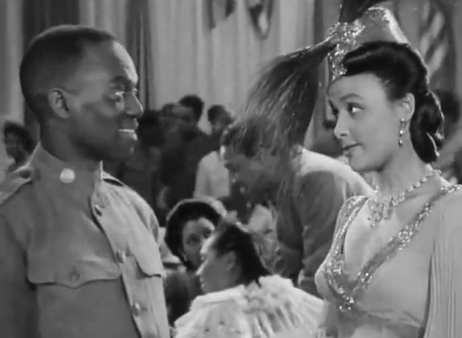
Stormy Weather, as a musical, is nearly unprecedented, and to my knowledge, there is only one other film to truly rival it as a spectacular showcase for African-American talents during this same period. That would be MGM’s Cabin in the Sky (1943).
But it’s not simply the case that this is a gathering of an all-black cast. Often we look at a film or a director based on extenuating circumstances. Sometimes it feels like we’re starved for certain types of portrayals and that can be the same for many minority representations. Thus, when you get anything passable, you’re bound to turn a blind eye to mediocrity because simply in discovering its existence, you have found a valuable cultural artifact.
If you can bear with my explanation, Stormy Weather might have been such a film since it is fairly unique among the seas of its contemporaries. But its individual uniqueness should not obscure the fact that these are some truly fantastic performers put on the stage, and they are deserving of more people singing their praises. People did back in the day, despite the racial intolerance, and they continue to deserve the recognition, so that’s what I’ll try to give them.
However, another interesting point of discussion is the production itself given the fact, behind the scenes, it was undoubtedly business as usual, with mostly whites calling the shots and pulling the strings. They have sculpted a bit of a faux reality where everything is fine and dandy in a segregated society and Bill “Bojangles” Robinson sits on a porch with all the neighborhood children regaling them with tales of his life thus far. And what a life it was!
He of course famously danced down the steps with a precocious Shirley Temple and got a dubious nod in Top Hat (1935) from Fred Astaire somewhat marred by blackface. In other words, Bojangles rightfully deserves this showcase, out of the shadow of other performers, with the limelight shining brightly on him for once.
In this highly fictitious and glossy rendition of his life story, he returns home from The Great War with his buddy Gabe Tucker (Dooley Wilson) who’s always trying to make himself out to be bigger than he is. Meanwhile, Bill looks to put his penchant for toe-tapping to good use.
He’s reunited with Selina Rogers (Lena Horne) the grown-up little sister of a childhood friend, and they hit it off. Little does he know she’s on the rise as a nightclub singer because besides having talent, she’s a class act, a first-rate personality, and really a knockout.
Somehow you lose track of the massive age difference between Robinson and Horne as they play so affably opposite one another and anyway we’re hardly hanging around Stormy Weather for the plot. It’s a musical. Let them dance.
Following suit, for the rest of the film, Robinson is bouncing around, meeting a minstrel show on a riverboat as he does a sand dance before they pogo around on their taps together. It was the first moment that feels truly electric.
Then, he’s pinch-hitting as a waiter at a little joint run by Ada Brown with the jovial Fats Waller yammering away to accompany his piano. Time has passed and Selina is doing well, calling in a favor to get Robinson a gig so he can get away from his menial existence. He gets a rousing round of applause soft-shoeing over big barrel drums only to get fired for hamming it up.
But the film goes out on top with the moment we’ve all been waiting for. Horne sings the title number, which in itself is a fine rendition, but Cab Calloway brings his scat singing, baggy pants-swishing energy into the picture followed by the apogee of it all.
The last 5 minutes or so are pure magic highlighted by one of the most spectacular numbers you’ll ever lay eyes on, and I’m trying my best not to exaggerate. The Nicholas Brothers are that extraordinary. Fred Astaire has already been mentioned due to his admiration for Bojangles, but he was equally quick to laud “Jumpin’ Jive” as the most spectacular of numbers. I won’t dare spoil it. Regardless, The Brothers do it all with their legs. Their skills are jawdroppingly dextrous. It verges on the superhuman.
Even as the comedy isn’t that hilarious and there are some jarring visuals like bonnets featuring golliwogs and the like, that’s not what this picture leads me to dwell on. More than anything, I marvel. As a viewer, I’m reminded that predominantly African-American urban centers really were places of immense culture and expression, as underrepresented as they might be on the silver screen.
Stormy Weather takes that Reinassance and a vast collection of talent from vaudeville and Broadway to Hollywood and lets it shine. Despite its share of flaws, what remains is a phenomenal array of artists, performers, and visionaries. Stormy Weather is an important remembrance and historical document, lest we forget how diverse and rich American culture really is.
4/5 Stars
